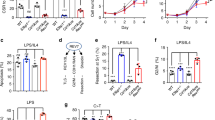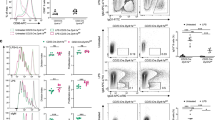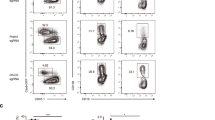Abstract
Antibodies, which are produced by B-lineage cells, consist of immunoglobulin heavy (IgH) and light (IgL) chains that have amino-terminal variable regions and carboxy-terminal constant regions. In response to antigens, B cells undergo two types of genomic alterations to increase antibody diversity. Affinity for antigen can be increased by introduction of point mutations into IgH and IgL variable regions by somatic hypermutation. In addition, antibody effector functions can be altered by changing the expressed IgH constant region exons through IgH class switch recombination (CSR)1,2,3. Somatic hypermutation and CSR both require the B-cell-specific activation-induced cytidine deaminase protein (AID)4,5,6, which initiates these reactions through its single-stranded (ss)DNA-specific cytidine deaminase activity7,8,9,10,11. In biochemical assays, replication protein A (RPA), a ssDNA-binding protein12, associates with phosphorylated AID from activated B cells and enhances AID activity on transcribed double-stranded (ds)DNA containing somatic hypermutation or CSR target sequences. This AID–RPA association, which requires phosphorylation, may provide a mechanism for allowing AID to access dsDNA targets in activated B cells13,14. Here we show that AID from B cells is phosphorylated on a consensus protein kinase A (PKA) site and that PKA is the physiological AID kinase. Thus, AID from non-lymphoid cells can be functionally phosphorylated by recombinant PKA to allow interaction with RPA and promote deamination of transcribed dsDNA substrates. Moreover, mutation of the major PKA phosphorylation site of AID preserves ssDNA deamination activity, but markedly reduces RPA-dependent dsDNA deamination activity and severely impairs the ability of AID to effect CSR in vivo. We conclude that PKA has a critical role in post-translational regulation of AID activity in B cells.
This is a preview of subscription content, access via your institution
Access options
Subscribe to this journal
Receive 51 print issues and online access
$199.00 per year
only $3.90 per issue
Buy this article
- Purchase on Springer Link
- Instant access to full article PDF
Prices may be subject to local taxes which are calculated during checkout




Similar content being viewed by others
References
Honjo, T., Kinoshita, K. & Muramatsu, M. Molecular mechanism of class switch recombination: Linkage with somatic hypermutation. Annu. Rev. Immunol. 20, 165–196 (2002)
Manis, J. P., Tian, M. & Alt, F. W. Mechanism and control of class-switch recombination. Trends Immunol. 23, 31–39 (2002)
Chaudhuri, J. & Alt, F. W. Class-switch recombination: interplay of transcription, DNA deamination and DNA repair. Nature Rev. Immunol. 4, 541–552 (2004)
Muramatsu, M. et al. Class switch recombination and hypermutation require activation-induced cytidine deaminase (AID), a potential RNA editing enzyme. Cell 102, 553–563 (2000)
Muramatsu, M. et al. Specific expression of activation-induced cytidine deaminase (AID), a novel member of the RNA-editing deaminase family in germinal center B cells. J. Biol. Chem. 274, 18470–18476 (1999)
Revy, P. et al. Activation-induced cytidine deaminase (AID) deficiency causes the autosomal recessive form of the Hyper-IgM syndrome (HIGM2). Cell 102, 565–575 (2000)
Chaudhuri, J. et al. Transcription-targeted DNA deamination by the AID antibody diversification enzyme. Nature 422, 726–730 (2003)
Bransteitter, R., Pham, P., Scharff, M. D. & Goodman, M. F. Activation-induced cytidine deaminase deaminates deoxycytidine on single-stranded DNA but requires the action of RNase. Proc. Natl Acad. Sci. USA 100, 4102–4107 (2003)
Dickerson, S. K., Market, E., Besmer, E. & Papavasiliou, F. N. AID mediates hypermutation by deaminating single stranded DNA. J. Exp. Med. 197, 1291–1296 (2003)
Petersen-Mahrt, S. K., Harris, R. S. & Neuberger, M. S. AID mutates E. coli suggesting a DNA deamination mechanism for antibody diversification. Nature 418, 99–103 (2002)
Ramiro, A. R., Stavropoulos, P., Jankovic, M. & Nussenzweig, M. C. Transcription enhances AID-mediated cytidine deamination by exposing single-stranded DNA on the nontemplate strand. Nature Immunol. 4, 452–456 (2003)
Wold, M. S. Replication protein A: a heterotrimeric, single-stranded DNA-binding protein required for eukaryotic DNA metabolism. Annu. Rev. Biochem. 66, 61–92 (1997)
Chaudhuri, J., Khuong, C. & Alt, F. W. Replication protein A interacts with AID to promote deamination of somatic hypermutation targets. Nature 430, 992–998 (2004)
Zarrin, A. A. et al. An evolutionarily conserved target motif for immunoglobulin class-switch recombination. Nature Immunol. 5, 1275–1281 (2004)
Tasken, K. & Aandahl, E. M. Localized effects of cAMP mediated by distinct routes of protein kinase A. Physiol. Rev. 84, 137–167 (2004)
Nakamura, M. et al. High frequency class switching of an IgM+ B lymphoma clone CH12F3 to IgA+ cells. Int. Immunol. 8, 193–201 (1996)
Manis, J. P. et al. Ku70 is required for late B cell development and immunoglobulin heavy chain class switching. J. Exp. Med. 187, 2081–2089 (1998)
Dominguez-Sola, D. & Dalla-Favera, R. PINning down the c-Myc oncoprotein. Nature Cell Biol. 6, 288–289 (2004)
Xu, Y. X., Hirose, Y., Zhou, X. Z., Lu, K. P. & Manley, J. L. Pin1 modulates the structure and function of human RNA polymerase II. Genes Dev. 17, 2765–2776 (2003)
Yang, X. J. Multisite protein modification and intramolecular signalling. Oncogene 24, 1653–1662 (2005)
Rada, C., Di Noia, J. M. & Neuberger, M. S. Mismatch recognition and uracil excision provide complementary paths to both Ig switching and the A/T-focused phase of somatic mutation. Mol. Cell 16, 163–171 (2004)
Weill, J. C. & Reynaud, C. A. RPA tightens AID to DNA…editing. Nature Immunol. 5, 876–878 (2004)
Barreto, V. M. et al. AID from bony fish catalyzes class switch recombination. J. Exp. Med. 202, 733–738 (2005)
Kotani, A. et al. A target selection of somatic hypermutations is regulated similarly between T and B cells upon activation-induced cytidine deaminase expression. Proc. Natl Acad. Sci. USA 102, 4506–4511 (2005)
Ramiro, A. R. et al. AID is required for c-myc/IgH chromosome translocations in vivo. Cell 118, 431–438 (2004)
Unniraman, S., Zhou, S. & Schatz, D. G. Identification of an AID-independent pathway for chromosomal translocations between the Igh switch region and Myc. Nature Immunol. 5, 1117–1123 (2004)
Torgersen, K. M., Vang, T., Abrahamsen, H., Yaqub, S. & Tasken, K. Molecular mechanisms for protein kinase A-mediated modulation of immune function. Cell. Signal. 14, 1–9 (2002)
Zhong, H., SuYang, H., Erdjument-Bromage, H., Tempst, P. & Ghosh, S. The transcriptional activity of NF-κB is regulated by the IκB-associated PKAc subunit through a cyclic AMP-independent mechanism. Cell 89, 413–424 (1997)
Fagarasan, S., Kinoshita, K., Muramatsu, M., Ikuta, K. & Honjo, T. In situ class switching and differentiation to IgA-producing cells in the gut lamina propria. Nature 413, 639–643 (2001)
Acknowledgements
We thank T. Honjo for providing AID-deficient mice and a retroviral vector for expression of AID in B cells, and R. Dalla-Favera and L. Pasqualucci for communicating unpublished findings. U.B. is the Prismedical fellow of the Irvington Institute of Immunology; S.D. is supported by a fellowship from the Swiss National Science Foundation; S.R. is supported by a National Research Service Award. This work was supported by an NIH grant to F.W.A. F.W.A. is an Investigator and G.L. an Associate of the Howard Hughes Medical Institute.
Author information
Authors and Affiliations
Corresponding author
Ethics declarations
Competing interests
Reprints and permissions information is available at npg.nature.com/reprintsandpermissions. The authors declare no competing financial interests.
Supplementary information
Supplementary Figure 1
PKA sites on AID. (PDF 84 kb)
Supplementary Figure 2
AIDS38A mutant fails to deaminate dsDNA. (PDF 572 kb)
Supplementary Figure 3
PKA activity and AID expression in B cells. (PDF 297 kb)
Supplementary Figure 4
PKA inhibition abolishes CSR in B cells. (PDF 491 kb)
Supplementary Notes
This file contains the Supplementary Figure Legends and the Supplementary Methods (DOC 38 kb)
Rights and permissions
About this article
Cite this article
Basu, U., Chaudhuri, J., Alpert, C. et al. The AID antibody diversification enzyme is regulated by protein kinase A phosphorylation. Nature 438, 508–511 (2005). https://doi.org/10.1038/nature04255
Received:
Accepted:
Published:
Issue Date:
DOI: https://doi.org/10.1038/nature04255
This article is cited by
-
Functions and consequences of AID/APOBEC-mediated DNA and RNA deamination
Nature Reviews Genetics (2022)
-
AID modulates carcinogenesis network via DNA demethylation in bladder urothelial cell carcinoma
Cell Death & Disease (2019)
-
Protein kinase A inhibits tumor mutator APOBEC3B through phosphorylation
Scientific Reports (2019)
-
Diversity of Immunoglobulin (Ig) Isotypes and the Role of Activation-Induced Cytidine Deaminase (AID) in Fish
Molecular Biotechnology (2018)
-
Mutations in human AID differentially affect its ability to deaminate cytidine and 5-methylcytidine in ssDNA substrates in vitro
Scientific Reports (2017)
Comments
By submitting a comment you agree to abide by our Terms and Community Guidelines. If you find something abusive or that does not comply with our terms or guidelines please flag it as inappropriate.



